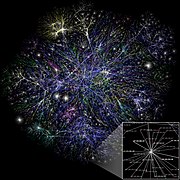The Internet PortalThe Internet (or internet) is the global system of interconnected computer networks that uses the Internet protocol suite (TCP/IP) to communicate between networks and devices. It is a network of networks that consists of private, public, academic, business, and government networks of local to global scope, linked by a broad array of electronic, wireless, and optical networking technologies. The Internet carries a vast range of information resources and services, such as the interlinked hypertext documents and applications of the World Wide Web (WWW), electronic mail, telephony, and file sharing. The origins of the Internet date back to research that enabled the time-sharing of computer resources, the development of packet switching in the 1960s and the design of computer networks for data communication. The set of rules (communication protocols) to enable internetworking on the Internet arose from research and development commissioned in the 1970s by the Defense Advanced Research Projects Agency (DARPA) of the United States Department of Defense in collaboration with universities and researchers across the United States and in the United Kingdom and France. The ARPANET initially served as a backbone for the interconnection of regional academic and military networks in the United States to enable resource sharing. The funding of the National Science Foundation Network as a new backbone in the 1980s, as well as private funding for other commercial extensions, encouraged worldwide participation in the development of new networking technologies and the merger of many networks using DARPA's Internet protocol suite. The linking of commercial networks and enterprises by the early 1990s, as well as the advent of the World Wide Web, marked the beginning of the transition to the modern Internet, and generated sustained exponential growth as generations of institutional, personal, and mobile computers were connected to the network. Although the Internet was widely used by academia in the 1980s, the subsequent commercialization in the 1990s and beyond incorporated its services and technologies into virtually every aspect of modern life. (Full article...) Selected article
An HTTP cookie is a parcel of textual information sent by a server to a World Wide Web browser and then sent back by the browser each time it accesses that server. HTTP cookies are used for user authentication, user tracking, and maintaining user-specific information such as site preferences and electronic shopping carts. Cookies have been of concern for Internet privacy, since they can be used for tracking the browsing of a user. As a result, they have been subject to legislation in various countries such as the United States, as well as the European Union. Cookies have also been criticised because the identification of users they provide is not always accurate and because they can be used for network attacks. Some alternatives to cookies exist, but have their own drawbacks. On the other hand, cookies have been subject to a number of misconceptions, mostly based on the erroneous notion that they are computer programs. Most modern browsers allow users to decide whether to accept cookies, but rejection makes some Web sites unusable.
Selected picture "All your base are belong to us" (often shortened to "All Your Base", "AYBABTU", or simply "AYB") is a broken English phrase (see Engrish) that sparked an Internet phenomenon in 2001 and 2002, with the spread of a Flash animation that depicted the slogan. The text is taken from the opening cut scene of the European Sega Mega Drive version of Zero Wing, a Japanese video game by Toaplan. News
Wikinews Internet portal
WikiProjects
Did you know (auto-generated) -
Selected biography
William Henry Gates III (born 28 October 1955) is an American entrepreneur, software executive, philanthropist and chairman of Microsoft, the software company he founded with Paul Allen. During his career at Microsoft he has held the positions of CEO and chief software architect, and he remains the largest individual shareholder with more than 9% of the common stock. Gates is one of the best-known entrepreneurs of the personal computer revolution. Although he is widely admired, his business tactics have been criticized as anti-competitive and in some instances ruled as such in court. Since amassing his fortune, Gates has pursued a number of philanthropic endeavors, donating large amounts of money to various charitable organizations and scientific research programs through the Bill & Melinda Gates Foundation, established in 2000. The annual Forbes magazine's list of The World's Billionaires has ranked Gates as the richest person in the world from 1995 to 2007, with recent estimates putting his net worth over $56 billion USD. When family wealth is considered, his family ranks second behind the Walton family, heirs of Wal-Mart founder Sam Walton. In July 2007, Fortune magazine reported that the increase in value of Mexican billionaire Carlos Slim's holdings of stock caused him to surpass Bill Gates as the world's richest man.
General images -The following are images from various internet-related articles on Wikipedia.
Selected quoteMore Did you know...
Main topics
Featured contentCategoriesRelated portalsThings you can do
Associated WikimediaThe following Wikimedia Foundation sister projects provide more on this subject:
Wikipedia's portals |





















































